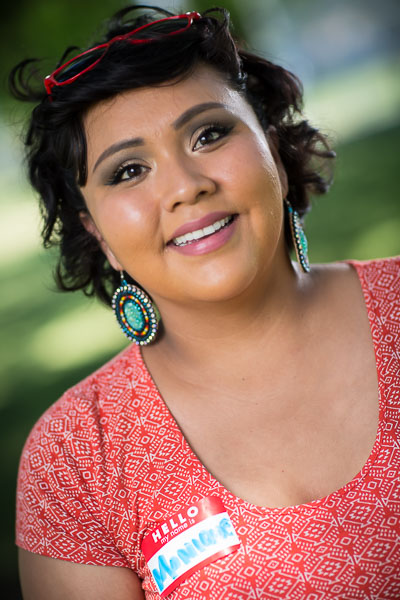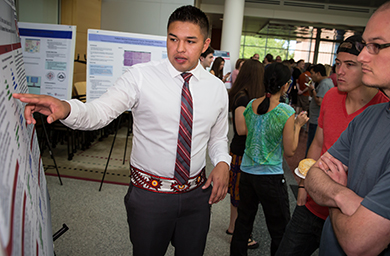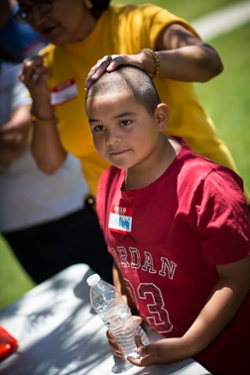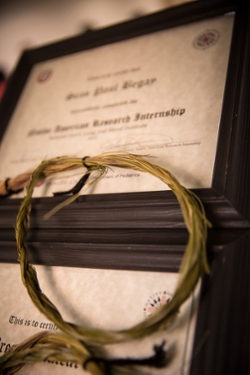There is a gaping hole in the biomedical sciences that desperately needs to be filled. Only 0.6 percent of scientists and 0.3 percent of physicians are Native Americans, making them the least represented minority group in these professions. In some respects, it's no wonder. Typically, Native Americans are shoehorned into a one-size-fits-all system that fails to take into consideration where they come from and what is important to them.

So it has been for Monique Tulley-Bahe, a 25-year-old Navajo (Diné) and psychology major at University of New Mexico. She winces as she recalls her high school counselor saying, "Let's be honest, girls like you don't go to college." That attitude, not uncommon as she was growing up, has riddled her with a self-doubt that she still struggles to overcome. According to other young Native Americans who, like her, took part in University of Utah's Native American Research Internship (NARI), that is not their only fight. Feelings of cultural isolation, a mistrust of White authority, guilt for leaving family and friends behind, are just a sampling of issues some face as they pursue higher education and a career.
NARI - a ten-week intensive program that gives undergraduates hands-on experience in laboratory or clinical research - was created with an ambition to break down barriers that hold Native Americans back. And all signs show that it's working. NARI has trained 60 students in five years. Of the 44 who have finished college so far, 95 percent have received a science degree, and 32 percent have continued on to medical or graduate school. Further, four have been recognized at the SACNAS national conference for their outstanding research.

"NARI provides community, a coming together and bonding together that provides strength for the students," says Maija Holsti, M.D., NARI program director. That's exactly what sets the program apart. As these students plunge into foreign territory, they are buoyed by a web of support. They're paired not only with scientific mentors who navigate them through a world of petri dishes and pipettes, but also with cultural mentors who counsel them when cultures clash. What do you do when you're asked to do research with animals, but you've been taught your entire life that they are sacred? The students also draw support from one another.
Echoing a tribal tradition, each week they gather in a "talking circle" to bounce ideas off one another and talk through health and social issues that trouble Native Americans. Knowing that her peers would understand, Tulley-Bahe shared her difficulty reconciling why her community was blind to the value of higher education. She explained she couldn't put her finger on it until she heard the term ‘historical trauma' in one of her college classes. "I thought, ‘Finally, there's a word for it,'" she says. The phrase sums up years of repression that still fuels an undercurrent of distrust in the ruling majority, including in their education system. Tulley-Bahe says she finds solace in connecting with like-minded individuals who, like her, are committed to change.

It's no accident that NARI rings true to these students. The program was designed in response to a call from Navajo Nation elders to increase the numbers of Native American professionals in the fields of science and medicine. Many reservations, remote and with scant health services, grapple with tough conditions such as diabetes, depression, and addiction. This next generation, the elders predict, will be able to earn their communities' trust and better serve their health needs. Ed Clark, M.D., chair of pediatrics, and pediatrician Carrie Byington, M.D., associate vice president for faculty and academic affairs and director of the Utah Center for Clinical and Translational Sciences (CCTS), sought to fill that niche by coupling University of Utah's rich resources in research and education with insider knowledge of what these young pioneers would need to succeed.
Clark and Byington built the program in partnership with tribal elders and organizations with close ties to their communities: the Urban Indian Center of Salt Lake City, and CCTS' Community Faces of Utah. CCTS, with its strong track record in building mentoring programs, was also a vital resource for identifying supportive mentors. Now in its sixth year, the summer internship has trained undergraduates from over 26 tribal nations, 34 colleges, and 19 home states.
"When Native Americans are excluded from science and medicine, these professions miss out on a rich array of skills and ideas," says Byington. "NARI is opening doors for those who have walked different paths, and lived different lives."

Beyond developing professional skills, NARI instills in the interns a sense of responsibility to bring their knowledge back home. Each summer they lead health workshops for the local Salt Lake City Native American community, and for tribes in far reaches of the state. As they explain the importance of vaccinations to adults, and engage kids in active play, they serve as examples for what others can achieve.
Tulley-Bahe says the mind-set of giving back is easy to embrace. It's what Navajos believe. "My parents taught me: your education is not just for yourself. And if you think it's just for yourself, you're wrong. You need to clear the path for others on your way up the mountain top."
Jenie Skoy contributed to this story
- The 2016 application cycle is now open until February 8, 2016. The NARI 2016 summer internship runs from May 31-August 5.
- Learn more about NARI and how to apply.
- Visit NARI on Facebook.